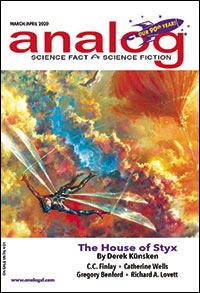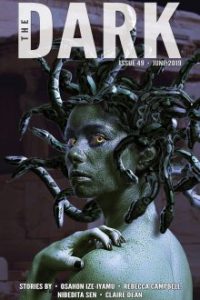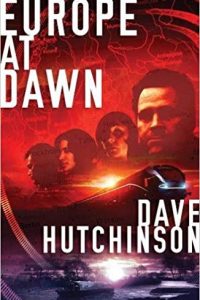Rich Horton Reviews Short Fiction: Analog, Asimov’s, Pulp Literature, and Uncanny
 Analog 3-4/20
Analog 3-4/20
Asimov’s 3-4/20
Pulp Literature Winter ’20
Uncanny 3-4/20
Analog offers several impressive stories in its March-April issue. Andy Dudak can be counted on for wild ideas, and “Midstrathe Exploding” delivers on that account. Ciaran is a pickpocket in Midstrathe City, which seems mainly known for the weirdly time-shifted explosion that engulfed it 200 years before and is still expanding with its victims frozen inside it. He has a friend and fellow thief who wants to steal enough to escape the city, but Ciaran has his reasons for staying. The story’s central idea is cool, but more importantly the personal story is involving and well integrated.
The other stories in this issue that intrigued me the most seem linked serially almost, though probably not on purpose. “The Smartest Damn Machine on Earth” by Bo Balder is an affecting short piece about an intelligent robot on an economically collapsed Earth, working in a carnival and hoping to find humans as curious as it. Which leads to “Rover” by A.T. Sayre, about a robot rover on Mars, also intelligent, continuing to explore the planet even though for some reason (easily guessed) no messages from Earth have come for decades. Which leads to another story of survival on Mars even though Earth is dead, “One Hundred” by Sean Monaghan, about the battle of the 100 people left on Mars to somehow make a viable “colony,” as there is no way to return home, told by the youth who rebel against the strict rules their elders have established – as we realize their rebellions are just what their society needs. Which leads to the story of a resource-limited society in the asteroids, “One Basket” by C.C. Finlay, about Alaya, a teenager on Ephigenia in Jupiter’s Trojans, who chafes at her mother’s protectiveness (her brother died in an accident) so is thrilled when her grandmother proposes a jaunt to the surface. But her grandmother has practical reasons – involving a neat scientific idea about finding water – and what’s more, the surface really is a dangerous place. So, an exciting story at one level, built around cool traditional SFnal speculation. Seems like Analog! (I could have extended these links further – there are three further stories about asteroid mining to one degree or another! Again, I guess that means I was reading Analog.)
The March-April Asimov’s features Mercurio D. Rivera‘s “Beyond the Tattered Veil of Stars“, an impressive story in the lineage of Theodore Sturgeon’s “Microcosmic God”. It’s told in two threads: one follows a series of entries from the chronicles of an alien race, as they deal with a series of catastrophes; and the other is told by a journalist involved with an old friend of his who has created something remarkable, a virtual simulation of an alternate world in which she subjects her simulated creatures to horrible crises, in the hope that their ingenuity will create something she can use in our Earth to deal with our problems. The story deals effectively with the ethical issues this raises – and the ethical issues surrounding the journalist’s motives – and also with the reactions of the simulated creatures, leading to a striking and dark (if ambiguously hopeful, but for whom?) conclusion.
I also enjoyed Tom Purdom’s “So Long as We Both“, in essence an extended contemplation on marriage (and child-bearing and -rearing) in a society of near immortals; as well as Ray Nayler‘s “Return to the Red Castle“, another of his pieces set in a future Istanbul. In this story, Irem has returned from a series of missions to a promising but ultimately hopeless planet, and due to time dilation no one she knows is still alive. Except – and here the story curiously pivots from examining an interesting method of planetary exploration (that reminded me of Rogue Moon), or from examining the dissociation Irem experiences after being “gone” for centuries, to something else fascinating. For Irem is re-introduced to one of her teachers, an android originally used in wars, then repurposed as a teacher. But her former teacher is decaying, losing memories, and Irem agrees to help in recovering them. However – maybe these memories were destroyed for a good reason? Nayler is as always thoughtful and original.
The novella this issue is “Semper Augustus” by Nancy Kress, about a girl named Jennie in a decaying near future US, in which current economic issues (particularly inequality) have been exacerbated by the introduction of alien technology under the control of the Chinese. Jennie is a very intelligent savant who is fortunate to end up in a gifted program at her rural school and, along with her cohort of likewise gifted children, to get a real education. Around her things get worse and worse, as the rich get richer and more isolated, and the poor turn to violence. She becomes convinced that the aliens are the main problem. Can they be forced to be the solution? It’s an interesting story, if just a bit programmatic, and not always quite convincing in its characters.
The latest issue of the small Canadian ‘zine Pulp Literature, which features fiction and poetry in multiple genres (and doesn’t really have an overtly pulpish feel, to my taste) includes a thoughtful near future SF story from Graham Robert Scott & Wallace Cleaves, “A Parable of Things That Crawl and Fly“. It’s told by a Native American woman as her son-in-law visits, asking for help, she knows. To her surprise he’s not asking for money, but help with a political campaign. The story powerfully tells of a future increasingly stratified due to longevity, and a tribal past the protagonist is trying to recover and preserve (via an interesting SFnal method), through characters that live and breathe… I don’t know either of the writers, so I came to the story without expectations, and I was really impressed. Pulp Literature also publishes non-SF and there’s a fine story here by A.M. Dellamonica, “Wrap Party“, about a theatre group as a show closes and the chaos caused by, well, lots of interpersonal things.
Uncanny‘s March-April issue is out. A.M. Dellamonica’s wife Kelly Robson leads off with an enjoyable (and quite sexy) story, “So You Want to be a Honeypot“, about a group of Russians trained to be “honeypots” – that is, to seduce people in order to get secrets from them. But their desires (a word with a wide spread of meaning) may not match their handler’s! Nice work, though I confess I don’t see a speculative aspect. I also found Natalia Theodoridou‘s “Georgie in the Sun” intriguing, about a vampire (perhaps the vampire) on a ship to another star – it turns out living forever is convenient on a slower-than-light ship, as is being away from the Sun. He’s got a woman with him, Eliza, whom he wakes every so often… and over the centuries and stars their relationship alters and alters.
Recommended Stories
“The Smartest Damn Machine in the World”, Bo Balder (Analog 3-4/20)
“Midstrathe Exploding”, Andy Dudak (Analog 3-4/20)
“One Basket”, C.C. Finlay (Analog 3-4/20)
“Return to the Red Castle”, Ray Nayler (Asimov’s 3-4/20)
“Beyond the Tattered Veil of Stars”, Mercurio D. Rivera (Asimov’s 3-4/20)
“Rover”, A.T. Sayre (Analog 3-4/20)
“A Parable of Things That Crawl and Fly”, Graham Robert Scott & Wallace Cleaves (Pulp Literature Winter ’20)
Rich Horton works for a major aerospace company in St. Louis MO. He has published over a dozen anthologies, including the yearly series The Year’s Best Science Fiction and Fantasy from Prime Books, and he is the Reprint Editor for Lightspeed Magazine. He contributes articles and reviews on SF and SF history to numerous publications.
This review and more like it in the April 2020 issue of Locus.
 While you are here, please take a moment to support Locus with a one-time or recurring donation. We rely on reader donations to keep the magazine and site going, and would like to keep the site paywall free, but WE NEED YOUR FINANCIAL SUPPORT to continue quality coverage of the science fiction and fantasy field.
While you are here, please take a moment to support Locus with a one-time or recurring donation. We rely on reader donations to keep the magazine and site going, and would like to keep the site paywall free, but WE NEED YOUR FINANCIAL SUPPORT to continue quality coverage of the science fiction and fantasy field.







